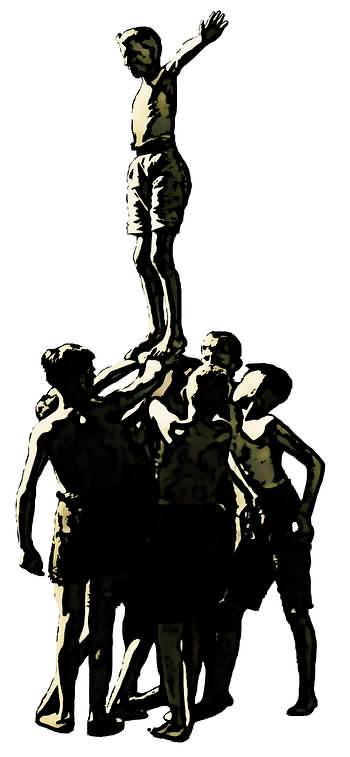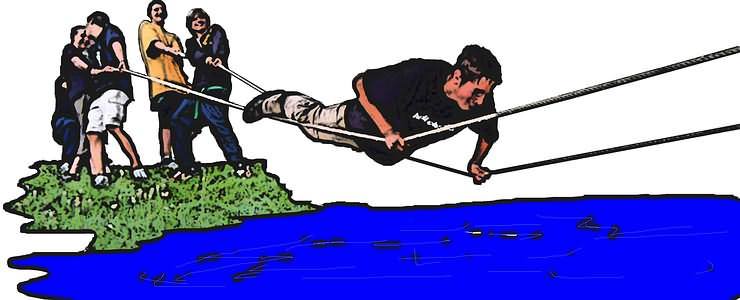source: www.youthwork-practice.com | 2000 Games, Devotions, Themes, Ideas and more for Youth Work
only for private using
Team player skills & team development

Team player skills & team development with suitable games
© www.youthwork-practice.com
The most critical team player skills for the ideal team.
In the context of team development in the youth group, we thought about which team player skills play a role in reaching the goal together as a group.
If you think about your youth group, you will notice that the different members have different skills and experiences. And if you draw a picture of your group: is it a bunch, or rather a group, a team? What kind of team spirit prevails? Do you have goals that you want to and can achieve?
The individual can only be as good as the team can work together or find its way together. In the vast majority of cases, the goal will not be achieved. What else is essential besides cooperation and trusting collaboration, good communication, coordination, organization, or resources (skills) to advance team building and team development to benefit all? What are the actual team-destroying factors?
Team players wanted, only together you reach the goal
The following goals are all essential characteristics for a successful team. However, hardly any team member will have all of them. It is, therefore, important how the team can profit from the sum of the skills brought in. And a team development will be successful if each team member gains further skills for himself and his team.
The ideal team:
-
Determination, Commitment, and mutual Motivation
-
Personal goals take a back seat; the group goal is more important.
-
Commitment: if everyone gets involved, burns for the goal and no one thinks “the others will do it” (in other words, wants to avoid the work), community and team cohesion are created.
-
Motivation grows through team cohesion, the team climate. People push each other up, help each other out, and are thus better able to get through lean periods together.
-
-
Communication skills (honest, open, constructive)
-
The more and more intensively the team coordinates with each other, the better a goal can be achieved. Those who keep information to themselves do not include and inform others, demotivate the others and create a hostile atmosphere. If you lose the overview and no longer talk to each other about what you are working on and the status, then the goal cannot be achieved.
-
Speaking your mind is essential, especially when you see problems, when you don't agree with decisions for different reasons, or when you can't understand them. A constructive, open approach to the opinions of others is essential.
-
-
Able to deal with conflict but also willing to compromise
-
You can't make an omelette without breaking eggs. Inevitably, there will be conflicts. It is crucial to deal with them constructively and objectively. And many a conflict also offers opportunities and new insights. A good compromise is often better than achieving nothing at all. Those who want to get their heads through the wall do not seem capable of dealing with conflict. However, it must be about the team, the goal, and not about wanting to impose your own will come hell or high water.
-
-
Reliability and Perseverance
-
Can your youth leaders rely on you, or do you half-ass your tasks?
-
Due to the distributed tasks, everyone can depend on others being completed on time and reliably. If you rely on others, you should be reliable yourself.
-
Perseverance is another thing. You take on a lot, sometimes too much. In a good team, you try to help each other and redistribute work. But you also have to say in good time that something is not quite working out.
-
-
Consideration, appreciation, and respect
-
Consideration and respect: accepting other opinions and approaches, being able to accept them.
-
Appreciation: everyone is happy to receive praise and words of appreciation. This motivates people and gives them the feeling that they have made a valuable contribution to the project's success. Do not always focus on your performance… Every contribution count, every cog in the wheel is essential.
-
Developing visions, goals, and solutions together, having the courage to try out new approaches.
-
The identification, the enthusiasm for a vision, for a goal motivates the group to work on the implementation.
-
The courage to try new ways should be part of the vision, the goal. New patterns emerge when the team thinks outside the box or tries something entirely new.
-
-
Organization: Clearly distribute roles and tasks, no competition, shared responsibility
-
Not everyone can do everything. And in a team, there are different strengths and weaknesses. Therefore, it is imperative to approach the division of tasks and responsibilities sensibly so that not everyone wants to be involved in everything.
-
Competitive battles are demotivating and hinder the team spirit, the enthusiasm for the common goal. Likewise, finger pointing is improper. The team shares responsibility when something does not go so well.
-
Behavior & soft skills of the ideal team member
-
Great need for harmony:
-
Even if there should be conflicts or different opinions, the respective group member cares about dealing with these issues factually and fairly.
-
-
Mobile and flexible:
-
Unpredictable conditions always occur and everywhere. Then stepping in and spontaneously taking over tasks is required.
-
-
Able to deal with conflict, but also willing to compromise:
-
Being able to deal with conflicts, withstand criticism and look for compromises are qualities that not everyone has. Going it alone and having your head in the clouds are unproductive for the team.
-
-
Confident, open-minded, and willing to learn:
-
Team members appreciate self-confidence, open-mindedness to others' opinions and ideas, and dabbles in new tasks without immediately becoming despondent.
-
-
Determined and helpful
-
Structured and purposeful approach, but also does not lose sight of the team with its interests, abilities. Behaves loyally towards the team, is helpful, shows respect and empathy.
-
-
Can convince and is not afraid to take responsibility.
-
Taking responsibility also means, if things don't go well, standing up for it together and not blaming the others.
-
-
Reliable
-
Works independently and requires little supervision but is very communicative and can work well with others. It can also be said that assigned tasks and responsibilities are reliably “worked through.”
-

Teambuilding with several days events, e.g. canoe tour
© www.youthwork-practice.com
Team-building measures through playful situations & challenges
There are many ways to take team-building action in youth work through playful situations and shared challenges and activities. Ultimately, children and young people benefit from this throughout their lives. After all, the skills mentioned above are of enormous advantage in later professional life. Children and young people who have learned to operate within a group, assert themselves, and contribute to and for the community, will find it easier to be team players later in life. As a coach, advisor, and observer, the youth leader can form the group as a team and offer valuable support to the group by selecting suitable games and tasks and feedback. For several days, joint activities and trips provide exceptional, unique opportunities to find each other as a team.
-
Group games: Selection of games which mainly address the group as a whole and not as individuals.
-
Skill games: which abilities, skills can be used depending on the task? How skillful is the group to solve a task together?
-
Trust games: Trust, can I rely on the others, trust them? How much do I trust others?
-
Vacation trips & activities: Independence, but also the social behavior such as helpfulness, commitment to others, consideration & respect, as well as living together for several days, present some kids with tremendous and unfamiliar challenges. What is the individual willing to give, what is it ready to endure? What is suitable for the atmosphere, and how does the group deal with conflicts and feedback?
2 typical games — you find more games in the game collection
The spider's web
Indeed, one of the most famous and popular team event games is the spider's web. Cords are stretched between 2 trees. The ropes are extended so that different-sized passages remain. The whole group must now try to get to the other side of the spider's web without touching it. This is made more difficult by the fact that each person must choose a different passage. The group must think about a strategy in which order and opening each person should slip. The players are passed through one of the upper openings by the others.
The acid lake
In the middle of the lake, there is a small island with a mysterious object. The task now is to recover this object without coming into contact with the lake.
This task can be made easy or difficult depending on the group. The lake is marked by a large circle made of ropes or sawdust. The diameter is undoubtedly the measure of difficulty.

Team player skills & team development with suitable games
© www.youthwork-practice.com
But how can you get to the object? Either the group stretches a kind of rope bridge with the help of a few strings or tries it with long poles, or the group comes up with other ideas.
Can the object perhaps be grabbed? With the help of exceedingly long poles and a “loop,” or a hook?
More suitable articles
- Indoor Team games
- Cooperation Games
- Games of Trust
- Cooperative Adventure Games
- Conflicts and Rules
- Group processes and different phases of a group
[ © www.youthwork-practice.com | 2000 Games and Ideas for Youth Work ]






